- Clone
- 6H6 (See other available formats)
- Regulatory Status
- RUO
- Other Names
- IL-3Rα, IL-3 Receptor alpha
- Isotype
- Mouse IgG1, κ
- Ave. Rating
- Submit a Review
- Product Citations
- 12 publications
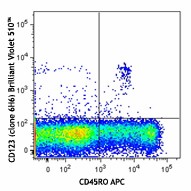
| Cat # | Size | Price | Save |
|---|---|---|---|
| 306021 | 25 tests | ¥43,560 | |
| 306022 | 100 tests | ¥87,120 |
CD123 is the 70 kD transmembrane α chain of the IL-3 receptor. Alone, CD123 binds IL-3 with low affinity; when CD123 associates with CD131 (common β chain), it binds IL-3 with high affinity. CD123 does not transduce intracellular signals upon binding IL-3 and requires the β chain for this function. CD123 is expressed by myeloid precursors, macrophages, dendritic cells, mast cells, basophils, megakaryocytes, and some B cells.
Product DetailsProduct Details
- Verified Reactivity
- Human
- Reported Reactivity
- Rhesus
- Antibody Type
- Monoclonal
- Host Species
- Mouse
- Immunogen
- Human IL-3Rα transfected COS cells.
- Formulation
- Phosphate-buffered solution, pH 7.2, containing 0.09% sodium azide and BSA (origin USA).
- Preparation
- The antibody was purified by affinity chromatography and conjugated with Brilliant Violet 510™ under optimal conditions.
- Concentration
- Lot-specific (to obtain lot-specific concentration and expiration, please enter the lot number in our Certificate of Analysis online tool.)
- Storage & Handling
- The antibody solution should be stored undiluted between 2°C and 8°C, and protected from prolonged exposure to light. Do not freeze.
- Application
-
FC - Quality tested
- Recommended Usage
-
Each lot of this antibody is quality control tested by immunofluorescent staining with flow cytometric analysis. For flow cytometric staining, the suggested use of this reagent is 5 µl per million cells in 100 µl staining volume or 5 µl per 100 µl of whole blood.
Brilliant Violet 510™ excites at 405 nm and emits at 510 nm. The bandpass filter 510/50 nm is recommended for detection, although filter optimization may be required depending on other fluorophores used. Be sure to verify that your cytometer configuration and software setup are appropriate for detecting this channel. Refer to your instrument manual or manufacturer for support. Brilliant Violet 510™ is a trademark of Sirigen Group Ltd.
Learn more about Brilliant Violet™.
This product is subject to proprietary rights of Sirigen Inc. and is made and sold under license from Sirigen Inc. The purchase of this product conveys to the buyer a non-transferable right to use the purchased product for research purposes only. This product may not be resold or incorporated in any manner into another product for resale. Any use for therapeutics or diagnostics is strictly prohibited. This product is covered by U.S. Patent(s), pending patent applications and foreign equivalents. - Excitation Laser
-
Violet Laser (405 nm)
- Application Notes
-
Clone 6H6 does not inhibit IL-3 binding to low- or high-affinity IL-3Rs. Additional reported applications (for the relevant formats) include: Western blotting1, immunoprecipitation1, and immunohistochemical staining of acetone-fixed frozen sections2 and also paraformaldehyde fixed paraffin embedded tissue7.
-
Application References
(PubMed link indicates BioLegend citation) -
- Sun Q, et al. 1996. Blood 87:83. (IP, WB)
- Herling M, et al. 2003. Blood 101:5007. (IHC)
- Charles N, et al. 2010. Nat. Med. 16:701. (FC) PubMed
- Martin-Gayo E, et al. 2010. Blood 115:5366. PubMed
- Chen SC, et al. 2010. Arch Dermatol Res. 302:113. PubMed
- Liu Y, et al. 2012. Food Chem Toxicol. 50:1920. PubMed
- Peduzzi E, et al. 2007. J. Invest. Dermatol. 127:638. (IHC)
- Product Citations
-
- RRID
-
AB_2562067 (BioLegend Cat. No. 306021)
AB_2562068 (BioLegend Cat. No. 306022)
Antigen Details
- Structure
- Ig superfamily, type I transmembrane glycoprotein, associates with CDw131, 70 kD
- Distribution
-
Myeloid precursors, basophils, mast cells, macrophages, dendritic cells, megakaryocytes, subset of lymphocytes
- Function
- Hematopoietic cell proliferation, differentiation
- Ligand/Receptor
- IL-3
- Cell Type
- Basophils, Dendritic cells, Hematopoietic stem and progenitors, Lymphocytes, Macrophages, Mast cells, Megakaryocytes
- Biology Area
- Immunology
- Molecular Family
- CD Molecules, Cytokine/Chemokine Receptors
- Antigen References
-
1. Miyajima A, et al. 1993. Blood 82:1960.
- Gene ID
- 3563 View all products for this Gene ID
- UniProt
- View information about CD123 on UniProt.org
Related FAQs
Other Formats
View All CD123 Reagents Request Custom ConjugationCustomers Also Purchased
Compare Data Across All Formats
This data display is provided for general comparisons between formats.
Your actual data may vary due to variations in samples, target cells, instruments and their settings, staining conditions, and other factors.
If you need assistance with selecting the best format contact our expert technical support team.
-
Biotin anti-human CD123

Human peripheral blood lymphocytes stained with 6H6 PE and C... -
PE anti-human CD123

Human peripheral blood lymphocytes stained with 6H6 PE and C... 
Multiplexed IHC staining of PE anti-CD123 (clone 6H6) on for... -
Purified anti-human CD123

Human peripheral blood lymphocytes stained with 6H6 PE and C... -
PE/Cyanine5 anti-human CD123

Human peripheral blood lymphocytes stained with CD45RO FITC ... -
PE/Cyanine7 anti-human CD123

Human peripheral blood lymphocytes stained with CD45RO FITC ... -
APC anti-human CD123
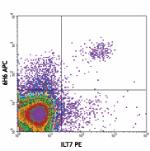
CD14- human peripheral blood mononuclear cells stained with ... -
FITC anti-human CD123
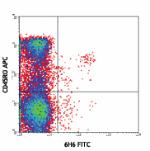
Human peripheral blood leukocytes stained with CD45RO APC an... -
PerCP/Cyanine5.5 anti-human CD123

Human peripheral blood lymphocytes stained with CD123 (clone... -
Brilliant Violet 421™ anti-human CD123
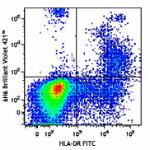
Human peripheral blood leukocytes were stained with HLA-DR F... 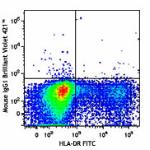
-
Brilliant Violet 650™ anti-human CD123
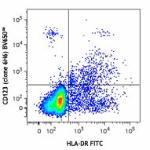
Human peripheral blood leukocytes were stained with HLA-DR F... 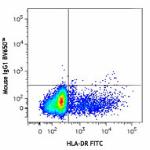
-
Brilliant Violet 510™ anti-human CD123
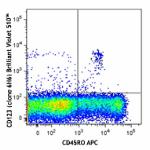
Human peripheral blood lymphocytes were stained with CD45RO ... 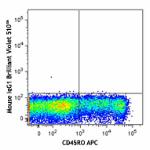
-
Alexa Fluor® 647 anti-human CD123
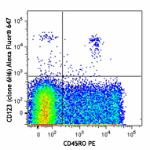
Human peripheral blood lymphocytes were stained with CD45RO ... 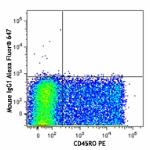
-
Brilliant Violet 605™ anti-human CD123
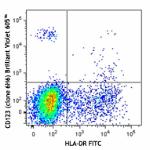
Human peripheral blood lymphocytes were stained with HLA-DR ... 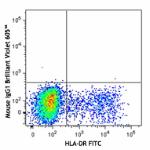
-
Purified anti-human CD123 (Maxpar® Ready)
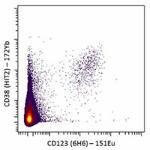
Human lysed whole blood stained with 151Eu anti-CD123 (6H6) ... -
Brilliant Violet 711™ anti-human CD123
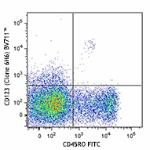
Human peripheral blood lymphocytes were stained with CD45RO ... 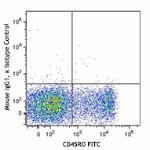
-
Brilliant Violet 785™ anti-human CD123
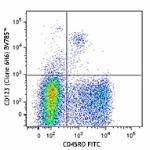
Human peripheral blood lymphocytes were stained with CD45RO ... 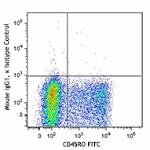
-
PE/Dazzle™ 594 anti-human CD123
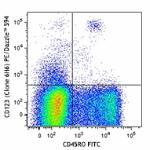
Human peripheral blood lymphocytes were stained with CD45RO ... 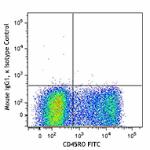
-
Alexa Fluor® 488 anti-human CD123
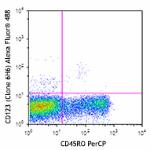
Human peripheral blood lymphocytes were stained with CD45RO ... 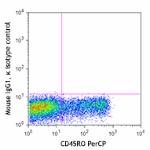
-
PE/Cyanine7 anti-human CD123
Typical results from human peripheral blood lymphocytes stai... -
TotalSeq™-A0064 anti-human CD123
-
Alexa Fluor® 700 anti-human CD123

Human lysed whole blood was stained with CD45RO FITC and CD... -
APC/Fire™ 750 anti-human CD123

Human lysed whole blood was stained with CD45RO FITC and CD1... -
Pacific Blue™ anti-human CD123

Human lysed whole blood was stained with CD45RO FITC and CD1... -
TotalSeq™-C0064 anti-human CD123
-
TotalSeq™-B0064 anti-human CD123
-
TotalSeq™-D0064 anti-human CD123
-
PerCP anti-human CD123

Human peripheral blood lymphocytes were stained with CD45RO ... -
GMP PE/Cyanine7 anti-human CD123
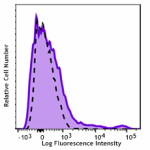
Typical results from human peripheral blood lymphocytes stai... -
APC/Fire™ 810 anti-human CD123 Antibody

Human peripheral blood lymphocytes were stained with anti-hu... -
APC anti-human CD123
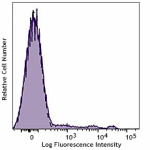
Typical results from Human peripheral blood lymphocytes stai... -
PE anti-human CD123
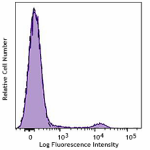
Typical results from Human peripheral blood lymphocytes stai... -
Pacific Blue™ anti-human CD123

Typical results from Human peripheral blood lymphocytes stai... -
Spark Red™ 718 anti-human CD123 (Flexi-Fluor™)
-
PerCP anti-human CD123

Typical results from human peripheral blood lymphocytes stai... -
PerCP/Cyanine5.5 anti-human CD123

Typical results from human peripheral blood lymphocytes stai... -
Spark PLUS UV395™ anti-human CD123 Antibody

Human peripheral blood lymphocytes were stained with anti-hu...














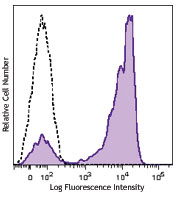
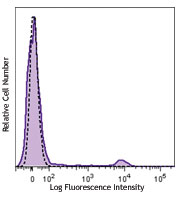
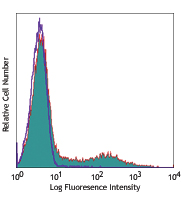
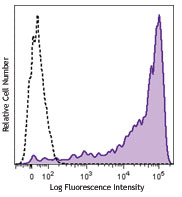
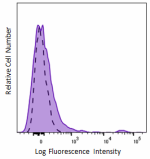







Follow Us